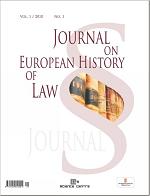A Brief History of River Navigation in Bohemia up to the 19th Century – Part 2.
A Brief History of River Navigation in Bohemia up to the 19th Century – Part 2.
Author(s): Bohumil PoláčekSubject(s): Law, Constitution, Jurisprudence
Published by: Evropská společnost pro právní dějiny, z.s.
Keywords: Water toll; Navigation Regulations; Water court; Navigation Fund; Navigation committee.
Summary/Abstract: On November 24, 1762 Vienna issued an order prohibiting boatswains from employing any persons suffering from alcoholism. The Edict of May 15, 1766 issued the Rates in the Výtoň water toll in Prague. This rate sheet specified how much should be paid in money and how much in material. Navigation Regulations were issued in the Edict of January 20, 1770. Under this order all and every types of boats, which travel up and down on the Danube and which are commonly used by the boatswains and other boat owners authorized to transport passengers up and down and transportation of cargo and other goods must not be in the worn-out, defective and damaged condition, but must be completely solid, durable and suitable for navigating and carrying the load. Vienna establishes the main toll and water court. Financing of water structures was to be provided by the “Navigation Fund", set up by the Edict issued by Maria Theresa in 1766. Initially the fund collected a part of the general water toll which was established in 1719 and since 1770 the fund collected the entire toll and duty from four customs houses in Bohemia. Other tolls were closed again. The Directorate of Water Navigation was managed by the executive body of the navigation committee, which was established in 1770. As a result of the Supreme Command, the circular dated April 29, 1775 ordered that the water weirs which stood in the way of the navigation were to be completely demolished and the millers were allowed to get the power for their mills only by the method which is not harmful and which has been pre-approved by the governorates. Given the fact that navigable rivers, which belong to the common property of the State Regalia Principis [imperial privilege] and can not become private property, therefore are still reserved for the highest power and therefore their use should be furnished for the common good, the supreme court decision published by the Court Decree of June 14, 1776 ordered that all the weirs, which are desirable for demolition or closure, should be automatically and without any interventions of the dominions or millers cancelled or closed. Otherwise, every structure about which the office has learned and which is found to be an obstacle to navigation must be immediately demolished at the cost of the offender. In order that the millers did not cause any difficulties for the navigation by their arbitrary modifications of weirs, Maria Theresa issued a new navigation order on May 31, 1777, known as the “Navigation Regulations”. Navigation guilds were abolished in 1783, which resulted in the freedom of navigation.
Journal: Journal on European History of Law
- Issue Year: 3/2012
- Issue No: 1
- Page Range: 70-78
- Page Count: 9
- Language: English

